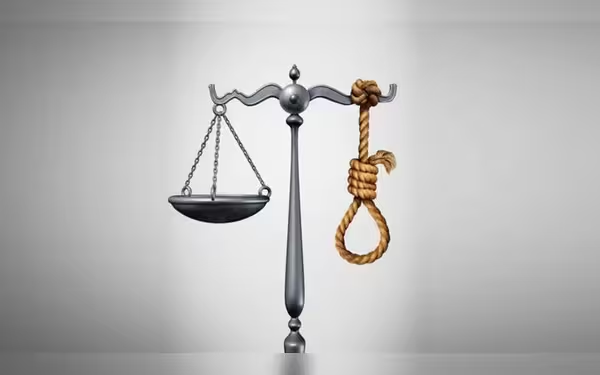Saturday, November 16, 2024 07:43 PM
Death Penalty Debate in Pakistan: Crime Rates and Human Rights
- Over 6,000 prisoners await execution in Pakistan.
- Crime rates continue to rise despite capital punishment.
- Judicial inefficiency raises concerns about death penalty fairness.
 Image Credits: thefridaytimes
Image Credits: thefridaytimesThe article discusses the rising crime rates in Pakistan amid ongoing debates about the death penalty and its implications for human rights.
The death penalty, often referred to as capital punishment, is a controversial topic that has sparked intense debate in Pakistan and around the world. It involves the state-sanctioned execution of individuals found guilty of serious crimes such as murder, treason, or drug trafficking. While some argue that it serves as a deterrent to crime, others believe it is a violation of fundamental human rights and an outdated form of punishment.
In Pakistan, the legal system currently holds over 6,000 prisoners on death row, awaiting their ultimate fate. Despite the continued use of the death penalty, crime rates in major cities have not shown any significant decline. In fact, reports indicate that crime rates are on the rise, raising questions about the effectiveness of capital punishment as a deterrent. Justice Project Pakistan (JPP) has highlighted these concerns, suggesting that the country must reconsider its stance on the death penalty.
According to the JPP report, no executions have taken place since 2019, yet the number of individuals receiving death sentences continues to increase each year. This growing number of death row inmates reflects a judicial system that is perceived as inefficient and slow. The psychological toll on these prisoners is immense, as they live in a state of constant anxiety and uncertainty, which does not serve the cause of justice.
Regional disparities in death row populations are also alarming. Punjab and Khyber-Pakhtunkhwa account for the majority of death row inmates, with 2,505 and 2,311 prisoners, respectively. In contrast, Sindh and Baluchistan have significantly fewer death row prisoners, with 557 and 398, respectively. This uneven distribution raises concerns about fairness and equality within the judicial process.
Globally, there is a growing movement to abolish the death penalty. Many countries have recognized that it does not effectively reduce crime rates and that it often targets the most vulnerable members of society, including the poor and ethnic minorities. The argument against the death penalty is compelling: it is irreversible, and the risk of executing an innocent person is a grave concern. Since 1973, over 197 individuals in the United States have been exonerated after being wrongfully sentenced to death.
As the world moves towards a more humane approach to justice, it is essential for Pakistan to reflect on its use of the death penalty. The state must consider whether it has the right to take a life, especially when there are alternative methods of punishment that can be equally effective without resorting to execution. The death penalty is not a solution to crime; rather, it perpetuates a cycle of violence and despair.
The debate surrounding the death penalty in Pakistan is far from over. As society evolves, so too must our understanding of justice and human rights. It is crucial for citizens and lawmakers alike to engage in meaningful discussions about the implications of capital punishment and to explore more compassionate and effective ways to address crime. The time has come to prioritize human dignity and the right to life over outdated punitive measures.













